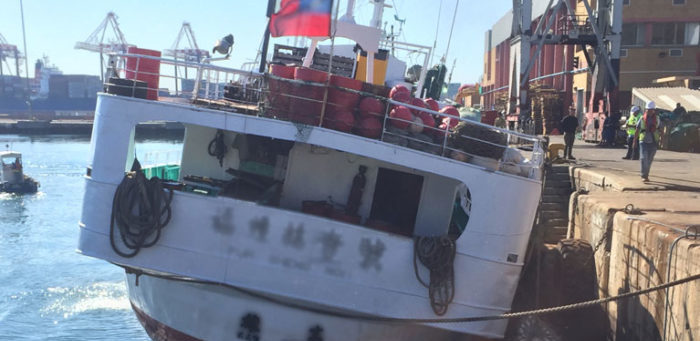The first detention of a fishing vessel under the provisions of the International Labour Organization’s Work in Fishing Convention, 2007 (No. 188) has taken place in late June, involving a foreign 380 GT vessel in Cape Town, South Africa, following complaints by the crew about working conditions, ILO informed.
Many of the crews on the world’s fishing vessels work in difficult, dangerous and dirty conditions that represent threats to their safety, and sometimes even their lives, while the industry is also concerned of extreme cases as forced labour and trafficking of fishers.
Entered into force on 6 November 2017, the Convention aims to ensure that those of the world’s 38 million fishers working on commercial fishing vessels have decent working conditions onboard, including conditions of service, accommodation and food, occupational safety and health, medical care and social security.
The Convention requires that all fishers have a written agreement, signed by the fishing vessel owner or the fishing vessel owners’ representative, which is comprehensible to them and which sets out the terms of their work, including such matters as methods of payment and the right to repatriation.
The incident
In this particular case, two inspectors from the South African Maritime Safety Authority (SAMSA), Thelma Paul and Pieter-Chris Blom, boarded the vessel following detention and found a long list of problems, including lack of documentation, poor accommodation, insufficient food for fishers, and poor safety and health conditions onboard.
Only two of the crew members had work agreements and there was not even a crew list. The lifebuoys were to be replaced because they were rotten, the anchors were not operational and one was even missing. Health and safety conditions were generally very poor,
…explains Thelma Paul.
In addition, crew members complained about harsh working conditions. This included having to manually pull in fish that were caught and carrying heavy loads to the fish storage facility. Some crew members said they wanted to leave the vessel.
Except from this, the inspectors were particularly concerned about the vessel’s stability. It was declared unseaworthy and all crew were evacuated following the first inspection.
Its owner was required to take steps to rectify problems. The vessel was released from detention once it had been stabilized, repaired and the other issues addressed. The owner of the vessel also paid a detention fee of R 12,365 (about US$895).
South Africa is one of ten countries to have ratified Convention No. 188 , and it has put in place a system to inspect both South African and foreign vessels for compliance with the Convention’s requirements.
Port State inspections may be carried out on foreign vessels visiting ports of countries that have ratified the Convention. Vessels from countries that have not ratified the Convention also can be inspected, to check that fishers have decent working conditions.
The action by South Africa demonstrates that Convention No. 188 can be used as a tool to address problems of mistreatment of fishers that occurs on many fishing vessels and in many fisheries. The Convention’s influence and effectiveness will grow as more States ratify and implement it as a part of their efforts to achieve true sustainability of fisheries. Widespread implementation of Convention No. 188 will, over time, make it increasingly difficult to mistreat crews, a concern of all who harvest, sell and consume fish,
…noted Brandt Wagner, an ILO official.






























































